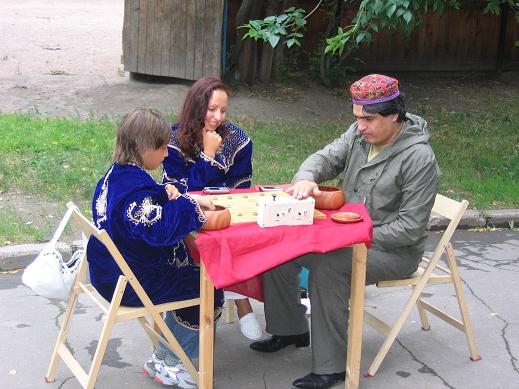European Go Congress 2007
(Report by Robert Jasiek)
The European Go Congress 2007 was held in Villach / Austria from July 14 to 28.
European Championship
Start
Round 1 was scheduled on Sunday at 14:00. It was already 4 hours later than the usual start of the rounds. So one might think that a start on time should have been possible. However, round 1 could not start until 15:30. The reasons were: The organizers did not strictly follow their announced deadline for registration, did not inform all strong players about the procedure for entering the supergroup, did not handle any corrections of ranks or missing players efficiently enough, had not tested their procedure for managing player data in their database and for import into the pairing program carefully enough, used a procedure with a bottleneck, and did not abide by all advice from the tournament supervisors in time (like setting the pairing program’s printout parameters already the day before).
The Supergroup
Since it was mainly the organizers’ mistake to miss Gert Schnider in the supergroup and it was noticed only shortly before the actual start of round 1, the tournament supervisors had to take a quick ad hoc decision. Previously the supergroup had already been “fixed”. To avoid a greater delay of round 1, the size of the supergroup was increased to 34. Because Matti Siivola, who was one of the tournament supervisors, was on the verge on possibly being dropped from the supergroup, he did not participate in the closely related decisions made by Oleg Gavrilov and Robert Jasiek. The supergroup should consist of an even number of players; therefore we increased its size to 34 instead 33. Luckily, this year the number of Korean 7d’s playing all 10 rounds and opting for the supergroup was not too great, so we did not have to draw lots there to keep the number of non-Europeans in the supergroup to at most 8. Thus Jong Wook Park, who was not in the supergroup in 2005 as a result of bad luck in the lottery, entered the supergroup this year. Unfortunately, he was not lucky this year either: He won all his played games but due to health problems could not play in rounds 8 and 9.
The Annual General Meeting
The AGM decided not to change the European Championship tournament system at that time. Therefore in the next years the number of Asians admitted to the supergroup is still at most 8 and the 2005 trouble might have to be repeated. The AGM did replace the old EGF Tournament Rules, the Fujitsu GP Guidelines, and the Fujitsu GP Regulations by the new EGF General Tournament Rules and the EGF Tournament System Rules though. This number of decisions caused a kind of rules gap: The tiebreakers for the European Championship are not specified in the written rules.
Tiebreakers
Due to that rules gap, the verbal rules for the European Championship required an ad hoc decision. The EGF Rules Commission decided and Tony Atkins, who is the EGF president, confirmed on behalf of the EGF Executive that for 2007 the tiebreakers declared at the start of the tournament according to the former rules would also still be used for the final results ordering. As it will be seen below, it was absolutely necessary to take such a decision right after the AGM, i.e., long before the end of the tournament. Another decision was made for the next years until the EGF would adopt a tournament system: Since the new EGF Tournament System Rules recommend not to use SODOS any longer, its usage stops also in the European Championship. From 2008 on and until a system change, the result criteria would be MMS – SOS. We have not set it to MMS – Direct Comparison because that might have been considered a too radical change not in line with the AGM’s temporary decision to continue discussion on the tournament system before actually changing it.
European Open Champion
When you look at the final result table athttp://goverband.at/egc2007/results/main_wall.htm
you have to be careful about an important typo: “SOSOS” in the table head is a mistake – it ought to be SODOS. The calculated SODOS values are correct though. As can be seen easily, Park’s health problem decided the European Open Champion title. Seok Ui Hong 7d KOR is the winner, although he lost to Jong Wook Park 7d KOR. The usage of Direct Comparison instead of SOS would have created a different tournament winner. Of course, the impact of the two missed rounds were equally important, however, it is reasonable to assume that Park would have won at least one of those games if he could have played them. With exactly one win of rounds 8 and 9, Park would have gotten the same MMS as he has now; for a missed round, a player receives half a MM point rounded down for all his missed rounds and his own starting MMS for his SOS. The latter aspect let Park’s SOS be smaller than Hong’s.
European Champion
Now every strong player from Kazan has become the European Champion at least once – what an achievement! Kazan versus the rest of Europe! The winner is Ilya Shikshin 6d RUS, who is the younger brother of Svetlana Shikshina. She got the title last year but could not participate this year because of recently having become a mother a few days before the congress. – The winner was decided by the second tiebreaker! Ilya had 7 wins, 303 SOS, and 207 SODOS while Alexandre Dinerchtein 7d RUS had 7 wins, 303 SOS, and 205 SODOS. Since Alexandre beat Ilya in round 8, Alexandre would have become the champion if Direct Comparison had been used instead of SOS. After the tournament, he told me that he prefers to see Direct Comparison being used for the final result ordering and hopes that that will be used in future. Since the AGM has postponed its system revision decision, it won’t be the case in 2008 though. As you know, I have long recommended to use Direct Comparison as the first (and possibly only) tiebreaker and the EGF Tournament System Rules now recommend the same. Nevertheless, for every tournament a new set of particular tournament rules needs to be adopted before the recommendation can take effect in practice.
Let us look on the opponents in some more detail:
Shikshin, Ilya:
Win Nat./Rank/MMS
34 + EU 5d 29
11 + EU 6d 30
21 + EU 5d 29
3 – KR 7d 32
33 + JP 5d 29
9 + EU 6d 30
2 – KR 7d 33
5 – EU 7d 31
14 + JP 6d 30
7 + CN 6d 30
Dinerchtein, Alexandre:
36 + EU 5d 29
1 – KR 7d 33
48 + EU 4d 28
8 + EU 7d 30
21 + EU 5d 29
3 – KR 7d 32
42 + EU 4d 28
4 + EU 6d 31
17 + EU 5d 30
2 – KR 7d 33
The top Japanese and Chinese dan players are of similar strength as Europeans with the same European rank. So one interesting aspect is to count the number Korean 7d opponents: Ilya met 2 while Alexandre met 3 of them. Alexandre’s losses are exactly against those Koreans while he beat all his 7 Europeans opponents. Since SOS-SODOS was used, this achievement has not been enough to become the European Champion. Alexandre has had a sort of bad luck: He was paired against a Korean 7d already in round 2; this gave him an early loss and in effect contributed to getting opponents with the final MMS 28. As Stefan Kaitschick 4d, the opponent number 42, has pointed out to me, his last round loss was against a 2d – something one would not normally expect. Had Stefan won that game, Alexandre would have become the winner with a SOS of 304.
Hence even more than for the European Open Champion title, Direct Comparison instead of the lottery SOS – SODOS would have made much more sense. – Analysis supports Direct Comparison. All former 2nd place getters feel particularly unlucky because SOS – SODOS was used and / or would have preferred Direct Comparison. Only the EGF politicians at the AGMs don’t care to continue the usage of randomizers yet longer and let the strong players suffer.
As a side effect, Jürgen Mattern’s record of having won 8 European Championships will still be held for some time.
Prizes
This year, Palmers Immobilien’s sponsorship allowed reasonable cash prizes for the top players. They are still somewhat low compared to the importance of the tournament but at least compared to other years (in some years, there is no prize money at all) the situation was much better.
Since it is tradition to honor the 10 top players, here they are:
Name Rank Nat MMS Wins
1 Hong, Seok Ui 7d KOR 33 9
2 Park, Jong Wook 7d KOR 33 8
3 Cho, Seok-bin 7d KOR 32 8
4 Shikshin, Ilya 6d RUS 31 7
5 Dinerchtein, Alexandre 7d RUS 31 7
6 Hong, Seul-Ki 7d KOR 31 7
7 Li, Ting 6d CN 30 6
8 Pop, Cristian Gabriel 7d ROM 30 6
9 Balogh, Pal 6d HU 30 6
10 Laatikainen, Vesa 5d FI 30 6
Of course, there were further prizes for weaker players with 7+ wins or 4+ wins for first / second week. This year, this was done fairly for both weeks but the prizes for 8+ wins were ridiculously low. E.g., 9 wins would get in particular a signed book instead of just a book.
European Masters
The results of the modified knockout system are:
* 1st Alexandre Dinerchtein 8d
* 2nd Ilya Shiksin 7d
* 3rd Cristian Pop 7d and Csaba Mero 6d
* 5th Pal Balogh 6d and Ondrej Silt 6d
* 7th Cornel Burzo 6d and Andrej Kulkov 6d
Also here, Alexandre beat Ilya. It has been said that Ilya changed from aggressive to a more territory orientated style. Since Alexandre is strong in the endgame, this might have been the wrong strategy for Ilya.
Weekend Tournament
366 players were in the list but quite some of them were ghosts because the registration process had been ambiguous: One could register for the weekend tournament already when registering for the congress on the first Saturday. Since many people change their mind, this procedure ought not to be used again. The result table athttp://goverband.at/egc2007/results/we_wall.htm
shows the correct table head with SOS – SOSOS but misses the actual SOSOS values, which are marked “?” below. You would need to enter them. Players with MMS 22 or above were:
# Name Rank Nat MMS Opponents Wins SOS SOSOS
1 HONG, SEOK UI 7d KR 24 23+ 5+ 13+ 3+ 2+ 5 111 ?
2 PARK, JONG WOOK 7d KR 23 7+ 6+ 4+ 17+ -1 4 112 ?
3 Cho, Seok-bin 7d KR 23 8+ 11+ 12+ -1 20+ 4 111 ?
4 Ugaeri, Masashi 6d JP 23 16+ 14+ -2 7+ 6+ 4 109 ?
Kazuo, Yoshihara 5d JP 23 19+ -1 9+ 44+ 10+ 4 109 ?
6 Jasiek, Robert 5d DE 22 27+ -2 25+ 13+ -4 3 109 ?
7 Yoshida, Takao 6d JP 22 -2 45+ 18+ -4 16+ 3 108 ?
8 Barisic, Dragan 5d BA 22 -3 59+ 15+ -10 18+ 3 106 ?
Radmacher, Bernd 4d DE 22 36+ 20+ -5 14+ 17+ 4 106 ?
Sannes, Pal 4d NO 22 41+ 38+ 14+ 8+ -5 4 106 ?
11Corlan, Lucian 5d RO 22 35+ -3 -17 42+ 15+ 3 105 ?
12Marigo, Francesco 4d IT 22 64+ 22+ -3 41+ 19+ 4 104 ?
Regardless of tradition, the prizes were not given to the top 5 players but only to the top 3. What a shame for such an important tournament! Further prizes went to young players but, as you might have guessed, being the strongest European in the tournament meant nothing in the view of the congress organizers… Is being young more important than being a successful European at the European Go Congresses?! Of course, the author had greater luck with the tiebreakers SOS – SOSOS, but this does not justify the degree of ignorance that too many congress organizations show towards a player’s achievements in tournaments. They complain that many strong players do not attend the congresses but why are the organizers surprised about this? Treat the top players appropriately and you will see stronger participation!
Rapid Tournament
Only 8 rounds were organized. Because a round was scheduled to start on 17:00, some players might still have been playing in their main tournament game and so dropping out of rounds was possible. To use opponent-scores-dependent tiebreakers then is thus highly doubtful. To my question to the organizers why the tiebreaker combination SOS – SOSOS was used, they replied: “Because it is the default in the pairing program.” What a stupid reason! Anything is good because it just exists?! What is more, in the congress bulletin #1, the tiebreakers announced for the Rapid are SOS – SODOS. Thus the tournament organizers contradicted themselves! At least they abided my advice as tournament supervisor to round down the MMS and tiebreakers for not played rounds, which is required by the EGF Tournament System Rules. (I could not prescribe tiebreakers because the Rapid is not a tournament held on request by the EGF; it is either organized by the congress organizers or not held at all.) However, you would have guessed, the information athttp://goverband.at/egc2007/results/rapid_wall.htm
is still wrong! There the rounding down is not applied yet. Thus the order of players in the final result list shown there is wrong! Here is the correct order for the top players:
# Name Rank Nat MMS Opponents Pt SOS SOSOS
1 Hong, Seok Ui 7d KR 40 16+ 3+ 2+ 4+ 15+ 7+ — 5+ 7 295 2359
2 Tormanen, Antti 4d FI 39 5+ 15+ -1 9+ 3+ -6 4+ 12+ 6 303 2350
3 Jasiek, Robert 5d DE 38 19+ -1 10+ 7+ -2 -4 29+ 17+ 5 299 2336
4 Miyazaki, Nobuy. 5d JP 38 — 8+ 6+ -1 16+ 3+ -2 11+ 5 299 2328
5 Yoshida, Takao 6d JP 38 -2 34+ -7 21+ 27+ 15+ 6+ -1 5 298 2325
6 Kazuo, Yoshihara 5d JP 38 — 30+ -4 43+ 10+ 2+ -5 9+ 5 293 2296
This time the author’s luck was even greater than in the weekend tournament: Place 3 was a SOSOS decision. Apparently, the organizers got frightened by all those SOS and SOSOS numbers as well and distributed prizes to all players with 5+ wins. When you read the congress bulletins, don’t trust the imprecise list of winners there; they ignore the tiebreakers and state the players with 5 wins in some arbitrary order.
So what happened at the prize giving? Nothing. The top 3 players (nor all top players with 5+ wins) were not honoured at all! How can any organization hold a tournament and then fail to respect the winners? Incredible! The same terrible behavior by the congress organizers was shown for all other side tournaments. What for to arrange prize giving ceremonies if the winners are not mentioned?! Why hold a closing ceremony without honoring more than one of the professionals teaching during the congress? This is disrespect, even if some of the professionals would have already departed. The players should be given their opportunity to express gratitude by giving an applause at least. What can be done for absence of presenting the winners of tournaments, sponsors, or local politicians can also be done for the professionals!
Side tournaments
For the side tournaments, it became even clearer that running tournaments was considered a burden rather than an honor and joy for the congress organizers. Criticism was met by pointing to 2 years of congress preparation (which is nothing compared to 4 years for other congresses) and how much thinking “has gotten into it”. They wanted to make something different and have radical changes, but they would not explain why. Congresses may be different and in some parts even radically so – but they should be held for the participants and not against them! A Pair Go tournament was not organized at all. Other tournaments that had been held during two evenings in past congresses were held on Wednesdays. The Lightning Tournament was held at the same times as the Rapid. Thus not surprisingly the numbers of participants dropped extremely! The 9×9 had 40 instead of typical 130, the 13×13 – 52 instead of 140, and the lightning 33 instead of 175-200 and of the 33 only 10 players played all rounds! An organizer justified the schedule saying that the author had been the only one to complain – having talked to various players, one must say though that many players did not like the organization of side tournaments at all because of the very bad schedule. This was not just the worst, but by far the worst organization of side tournaments I have seen in the congresses since 1993. Another excuse was rooms, but why then were a couple of rooms empty during the evenings? – If all that organization of side tournaments is considered that nasty and difficult, then why not simply use the ready systems and forms available on the web?
Lightning
This was announced as a McMahon tournament in the congress bulletin but it was held as a Swiss tournament. 10 minutes thinking time, top bar at 4d (?) and reduced (?) handicap for 3d and weaker. If we trust the result table, then SOS-SOSOS were being used. Maros Kral 1k SK got 8 wins, Krysztof Giedrojc 4d PL 7 wins. The lightning was one of the tournaments the congress organization decided to hold at all only shortly before the congress. At that time the author had offered to organize the tournament if necessary so that this essential tournament would be held for sure. Considering the low numbers of serious participants, one wonders why they did not accept the offer.
13×13
In the congress bulletin it had been announced as 5 rounds McMahon. This tournament system is extremely improper for a title tournament. Normally it had been a combined groups and knockout system, which is reasonable. The author complained very harshly before the tournament. The organizers first didn’t want to change anything because they considered it to be just one of the “fun events, not serious at all”. After further discussion, they offered me to organize it. Had that been clear before the congress, the author could have taken his time. However, during the congress he was also pretty busy, e.g., with holding part of the referee workshop. He might still have organized the 13×13, but doing it at the last minute with a major tournament system change could easily have been interpreted as taking an unfair advantage because he is one of the likely candidates for winning the tournament. So the author had to decline from organization and the actual organizer made a tiny improvement at the start of the tournament, turning it into a 6 rounds tournament. For sure, McMahon was a fake once more and it was a Swiss system as well. – So it was meant to be a fun tournament, but where is the fun in reducing the number of rounds from ca. 10 to 6, letting the players play their 2×13 minutes games with up to half an hour of sleeping breaks in between, and making it impossible to watch the “final” games when one was playing his own games? For some strange reason, the handicap depended on the “MMS” difference instead the rank difference. IIRC, it was Japanese handicap on the hoshi points, one stone per 5 MMS difference. Komi was 8.5 minus 2 for every point of excess MMS difference. The tiebreakers were SOS – SODOS (while in some tables the typo SOSOS appears where SODOS is meant). While the author made strategic mistakes too many times and thus got only 4 points, after round 6 there turned out to be 5 players with 5 wins! The tiebreaker lottery gave this table at the top:
Place / Name / Rank / Country / Wins / SOS / SODOS
1 Snidal, Bronislav 1d CZ 5 22 17
2 Kruml, Ondra 2d CZ 5 21 17
3 Butala, Gregor 4d SI 5 21 16
4 Toermaenen, Antti 4d FI 5 20 20
5 Cheburakhov, Andrey 5d RU 5 19 14
The author, who had got 2nd place last year, had to register thrice (!) to be allowed to participate. Last year’s winner Antti Toermaenen failed to do likewise, registered only twice and thus was prohibited from playing round 1!!! It is hard to imagine any worse organization of a tournament! Needless to say, Antti won all his games and defeated the place #1 player in the last round! The tiebreakers may have had their impact, however, the greatest tiebreaker of all was the bad tournament organization! The system was totally inappropriate for selecting a single strongest player. It is a model of lazy, uncaring tournament organization. The top 5 players played only 3 games against each other altogether. BTW, during the tournament the author had to point out some apparently random SOS and SODOS values; those appeared because a parameter “handicaps are taken into account for SOS, etc. calculation” had been selected accidentally. So the early rounds were paired essentially randomly.
9×9
Things were going almost as badly as in the 13×13. Swiss that was announced as McMahon, etc. The author does not recall the second tiebreaker (either SODOS or SOSOS); the first was SOS. Thinking time 9 minutes, free (!) handicap placement under Japanese Rules, komi 6.5 minus 1 per excess rank (or MMS?) difference point and another handicap stone every 10 points difference. After 8 rounds, which – incl. the lunch break – consumed most of the Wednesday, the two players with 7 wins were:
# Name Rank / Country / Wins / SOS
1 Surma, Mateusz 1d PL 7 36
2 Bro-Joergensen, Ulrich 4d DK 7 35
In round 6, the #2 player beat the #1 player. So Direct Comparison would have resulted in a different winner. Ulrich expressed his great disappointment about the bad choice of tiebreakers to me.
Pair go
The pair signed as Maria Zakharchenko made 5 out of 5 wins. There were 27 pairs.
Team Go
Only 14 teams attended this tournament. The Team M made 4.5 wins out of 5 but bonus points for nationality, rank differences, age, and gender were more important. Crazy Horse had the proper mixture for winning the tournament with 4 bonus points and just 2.5 real points.
AGM
Apparently, the age of ending the AGM at midnight has gone; this years it ended already at ca. 22:30 – must have been a new record. This, despite EGF Committee elections (without choice of alternative candidates this year), and several rules topics on the agenda. Apart from the usual bureaucracy (Gionata to question things that should or sometimes need not be questioned while every other delegates does not dare to raise his voice) – actually some points made by Gionata were very useful -, the 2011 congress will be in France (won due to almost no presentation compared to virtually no presentation of Poland), a Strong (meaning 6d+) Players Commission shall be formed, and the EGF General Tournament Rules and the EGF Tournament System Rules were adopted, so that the total length of valid general tournament rulesets is reduced to about half of what was used before! Good job, although only 13 or 7, respectively, delegates voted in favor of the change while the vast majority absented. Tiny changes were voted for, so the rulesets will be published a bit later. In particular “Simplified Ing Rules” is to become “Ing Rules”. Since there are the Ing 1991 Rules, the Ing 1996/7 Rules, and the Simplified Ing Rules and since the official Ing rulesets are very unclear and ambiguous (see the author’s commentaries), it is now more unclear than ever how to apply Ing rules in EGF tournaments in practice. Frank Janssen pointed out that he had used Ing rules, had been approved for that by the Ing people, and that usage had shown no problems. If so, then why does he teach something similar to Simplified Ing Rules to children and has never explained the Ing ko and game end rules to everybody? His stated view is more a pretence than reality. All delegates (note: members of the EGF Rules Commission are not delegates) voted in favor of canceling the “Simplified” because they prefer to take the sponsor money more than playing with rules that they and everybody could understand. It is sad that the EGF does not want to be as honest as the AGA, which affirms usage of the Kim-Simon-Straus commentary on the Ing Rules and gets sponsor money nevertheless. At least Ing Rules with Japanese playing material and pass stones have become another valid ruleset according to the new EGF General Tournament Rules. This could have been useful already during this tournament because there were not enough Ing boxes and clocks for all the boards. (Due to sponsorship by the Nihon Kiin in the form of supporting some of the professionals boards 1 to 16 of the main tournament used Japanese rules with 6.5 komi this year.) The AGM did not find it worth discussing that the Japanese 1989 Rules (which have become unbearable at least since the author’s latest commentary) are now replaced by Verbal European-Japanese Rules, which have been used already since the Saturday after the AGM.
The proposals for a change of European Championship tournament systems were discussed or (Swedish proposal and old Dutch proposal) drawn back. Every proposal got its major criticism of its drawbacks. So it has been essentially decided to continue discussion for another year. At least everybody is now aware of the features and drawbacks, so discussion might raise to a higher factual level.
Organizers’ Meetings
They were held but the author could not attend them.
Referee Workshop
There was a remarkable number of ca. 14-16 participants. Matti Siivola did the first two lectures on tournament rules, systems, and refereeing. The author held the lecture on the rules of playing. So how to apply “Ing Rules”? Every possible, major interpretation was explained. E.g., the superko of the Simplified Ing Rules versus the author’s interpretative ko rules (which are needed because the official ko rules consist mostly of gaps) for the official Ing ko rules. In practice, the Simplified Ing Rules are even more useful for the game end procedure because the official rules are mostly ambiguous there and the official interpretation by Mr. Yang from the Ing Chang-ki Wei-ch’i Educational Foundation is seriously flawed. – How to apply verbal Japanese rules? Use the basic ko rule also for determination of life and death in the scoring. Use hypothetical (verbally demonstrated or laid on a copy board) move-sequences starting with the attacker of a string currently analyzed for its status and try to construct two eyes for the defender at or around the analyzed string, even if it or some new stone near to it might be captured temporarily like in nakade, snapback, or bent-4. Don’t mind ko threats elsewhere on the board; their impact is immaterial in practice because life is something “local”.
Conclusion on the tournaments
Don’t use tiebreakers if you don’t even understand them! Don’t neglect to think about the tournaments, their systems, and registration procedures carefully in advance if you organize a congress! Respect the players and their interests and don’t just organize somehow because you have to!
From International Goe Newsletter «Goama»
![]() That’s why there were not many children on this festival.
That’s why there were not many children on this festival.![]() but we wanted to play out on fresh air.
but we wanted to play out on fresh air.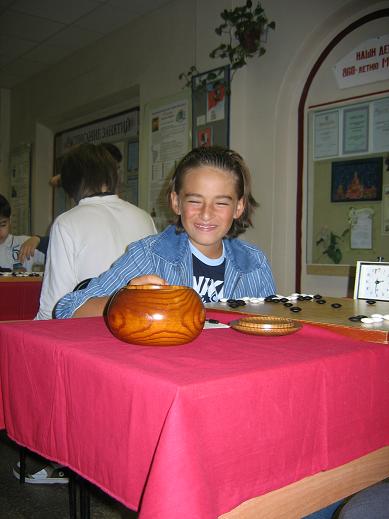
![]()
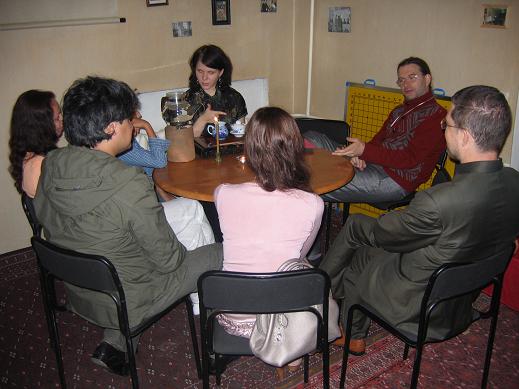
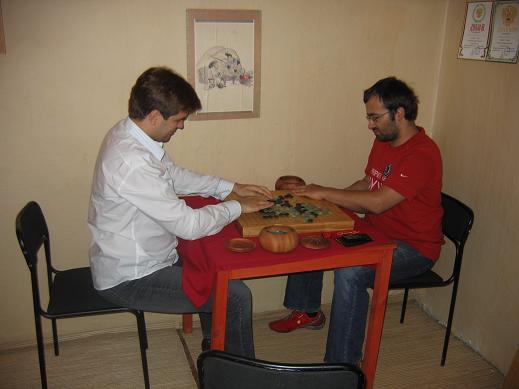
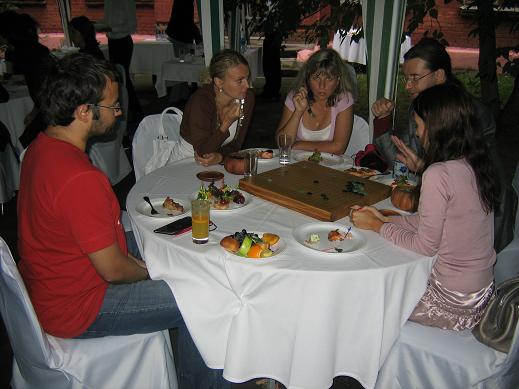
![]()
